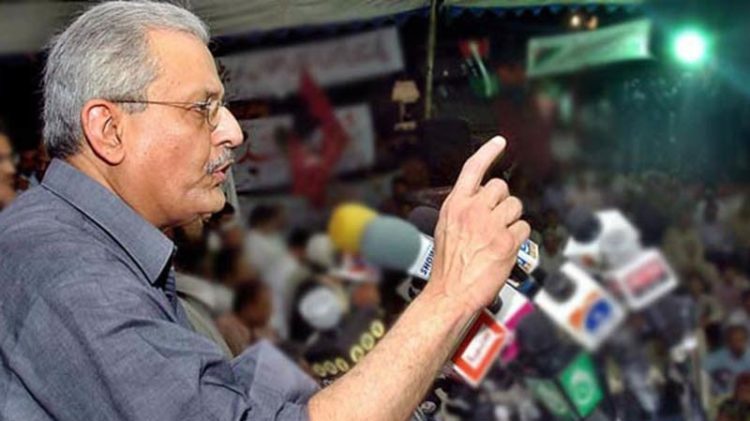- The prevention of Corruption Act, 1947
- The Public Representatives Disqualification Act, 1949
- The Elected Bodies Disqualification Ordinance, 1958
- The Ehtesab Act, 1997
- The National Accountability Bureau Ordinance, 1999
- Pakistan Penal Code (PPC) 1860 (sections 160-165);
- Prevention of Corruption Act (PCA), 1947;
- FIA Act, 1974; and
- NAB Ordinance, 1999
- We work under a system which has five types of applicability of law,-
- One set of rules and laws are for the ruling elite.
- The other set of rules are for the ruling civilian elite
- The third category of rules is for the collaborators of the ruling elite
- Fourth for the rich and the powerful
- Fifth for the ordinary citizens of Pakistan
- Accountability agencies are working under the dominance of Government;
- These agencies are used for political victimization;
- There is no mechanism for accountability of said agencies resulting in unbridled powers;
- The standalone attempts to curb the menace of corruption has failed to achieve the desired results.
- Strong perception that NAB is only laying its hands on petty suspects and putting them in prisons, whereas, the prime duty of the anti-corruption organisation was to take up mega-corruption cases and stop them.
- Recently observations have been made by the Courts regarding serious maladministration and want of proper procedures and supervision within NAB.
5. An analysis of existing situation leads to a conclusion that, there is a dire need to holistically review the existing accountability mechanism, therefore, creation of a statutory/independent body to oversee all aspects of corruption, with no group or entity outside its ambit is need of the hour. The creation of such an entity would also mean that the duplication in mandates of several agencies could be rationalized. Furthermore, People of Pakistan are expecting that Parliament, being the legislature, will act to ensure that menace of corruption is nipped in the bud and accountability is across the board, therefore, the following road map is proposed:
Federal Commission for Accountability — one authority, one law.
- All other parallel forums for accountability shall cease to exit.
- Forums for disciplinary actions and other related matters for persons belonging to Judiciary, armed forces and bureaucracy will remain functional; however, accountability will be the exclusive domain of the Commission.
Functions of the Commission
- Investigation and scrutiny of evidence by NAB;
- Preliminary decision as to filing of Reference or closure of investigation to be taken by NAB;
- Cases approved for Reference as well as closure of investigation shall be placed before the Commission for final decision in the matter.
- The NAB shall take preliminary decision as to the reference within 30 days of receipt of case, failing which the case shall be deemed to have been transferred to the Commission.
- The Commission shall, within 30 days, decide the matters placed before it failing which recommendation of NAB shall be deemed to have taken effect.
- The Court shall decide the Reference within a period of four months, however, a onetime extension of not more than one month can be taken from the Supreme Court.
- Chairman National Accountability Bureau (NAB) to be appointed by the Commission.
- Heads of Provincial NAB is to be appointed by the Chairman NAB and shall be ratified by the Commission.
- Assets declarations and other related matters of NAB officials to be submitted before the Commission for scrutinizing the same and shall also be made public.
- Annual report of Commission to be laid before both Houses of Parliament.
Composition of the Commission:
- One Member Judicial, a sitting Judge of the Supreme Court, to be nominated by the Chief Justice of Pakistan.
- One Member Armed Forces, not below the rank of Lieutenant General, to be nominated by the Joint Chief of Staff.
- Member Civil Services the senior most serving Grade-22 officer.
- One Member Police and Civil Armed Forces, to be nominated by the Ministry of Interior.
- Four Members, one each from Bar Associations, Human Rights Activists, journalists and professionals, to be nominated by the Chairman Senate, Speaker National Assembly and Chief Justice of Pakistan. The nominations will be ratified by the Senate, National Assembly and Judicial Commission.
- Four Members of Parliament, equally from both Houses and half from treasury and half from Opposition Benches, to be nominated by the Chairman Senate and Speaker National Assembly, respectively.
- Chairman of the Commission – to be elected by the members –term three year –nomination to be ratified by the both Houses of Parliament within 45 days failing which deemed to have been appointed.There shall be a bar on the Members of Parliament and members of armed forces on becoming the Chairman of the Commission.
- Secretariat- the Commission shall have a permanent Secretariat.
- The Secretariat shall initiate the process of seeking three months prior to the completion of tenure of the Commission. If any authority/organization fails to provide nomination with the stipulated time period, the same shall be asked to appear before the Joint sitting of Parliament to explain reasons for non-provision of nomination.
- The new Commission shall be in place on the date of completion of tenure of previous Commission.
Jurisdiction:
- One law,one authority –the Commission shall have jurisdiction with respect to,-
- Public Office holders
- Persons in the Service of Pakistan (in relation to the federation or the province, as the case may be)
- Judiciary (matters of corruption and corrupt practices to be taken up by Commission and other matters to be taken up by the Supreme Judicial Council)
- Armed forces (matters of corruption and corrupt practices to be taken up by the Commission and all other matters to be dealt with under the relevant laws)
- Any other person (body, corporate, entities, firms, etc.)
Investigation:
- NAB fully independent and autonomous body under the supervision of Commission
- Jurisdiction of FIA in corruption cases to be ousted/omitted
Supervision:
- Accountability Courts under the administrative control of Supreme Court of Pakistan.
Safeguard:
- A Judge of Supreme Court or of a High Court, as the case may be, to hear;
- Appeal against torture (during investigation)
- Excess of law (during trial)
Implementation Mechanism
To consider the above, raw, amongst other proposals, following mechanism is proposed:
- A Parliamentary Committee to be constituted to draft legislation and oversee its implementation with respect to:-
- Establishment of Commission
- Amendment of NAB Ordinance, 1999, to make it an autonomous investigating agency
- Amendment of FIA Act, 1974, for omitting jurisdiction with regard to cases of corruption.
- (Resolutions for constitution of Parliamentary Committee have already been passed by the Senate and National Assembly on 6th September, 2016 and 17th August, 2016, respectively. The Senate has transmitted the names of Members Senate of Pakistan for the said Committee on 28th September, 2016)
- The Committee shall hold public hearings with the stakeholders.
- The final draft of legislation shall also be circulated amongst the stakeholders and after seeking their input/opinion, the same shall be finalized.
- The Committee shall complete its task within a period of 100 days, however the Parliament may grant one time extension of 30 days, for which Resolutions shall be passed in the both Houses of Parliament.






















lol, tens of years of experience as a supposedly insightful lawmaker, and Mr. Rabani suggests more status quo to combat prevailing status quo. Janab, do away with British legal system. We are no more their colony. Are we? Make laws easily understandable by citizens and allow them to vote on a newly introduced pieces of legislation. Further, make judges as well as lawyers accountable for their tricks and tactics in courts. You know exactly how farcical and rotten our legal system is.
Amazing that you lack insight into combating corruption which is an unbelievably simpler feat to accomplish than your thoughtless solutions. Just remove/reduce contact between citizens and govt. functionaries and you will see the octopus of ground level corruption fade away. Once front men and pimps of superior officials are castrated, the ‘system’ will be cleansed. Also try cash less economy, you will see how useful will it be.
You are in a bubble sir, please get out of it
First hang your Party’s Co chairman for being the most corrupt person.
Then give lectures and write letters on Corruption
I wonder when will Raza Rabbani write an open letter to his boss Mr. Zardari?
CHAIRMAN Senate asking People of Pakistan. #ROFL
*our system is not corrupt, our people is corrupt that include general public.
Moral of the Story: when you get rid of you PONY your mind starts working (but it is not sure that direction of mind working is right), better to right this letter to your political party chairman.
So, that does not make you corrupt. Right!
and you are part of that system. sitting in a high office and crying? resign and join the masses if you cant change the system even after reaching that high
When Imran Khan says these this thing is simple words (as opposed to Raza Rabbani’s verbosity), they accuse him of derailing the democracy. Seems you can sell anything by making it complex.
IK is part of the same corrupt system. Look at him, what happened to him now. Democracy is a dirty system and corrupt anyone who joins it
YOU MR Raza rabbani, are the representative and defender of the most corrupt person in the history of pakistan, mr zardari. How you can say all this ? This is like a prostitute complaining about vulgarity
Exactly and this hurts me, disappoints me so much :'( … our politicians are so corrupt that they don’t even acknowledge. This is the worst than existence of corruption.
not least sense of self-respect to resign. khai jao tay mojaan urai jao..
If a common man cannot read or understand your law, how will s/he act upon it and how will you ensure its implementation?
It is not possible to have accountability in democracy and capitalism. Just look at United States and other democracies in West. Rich go Scott free and poor man suffers, look at the scams and scandals during credit crunch
if we want insaaf then we need Islamic system of Khilafah. The rule of law in Islam says that even if Fatima RA steals cut her hand.
enough of this democracy that serves only rich and powerful and lets work to establish Khilafah which will give rights to all – poor, weak, rich, powerful, powerless, minorities, women etc
And yet the mainstream media will keep brainwashing the common people of every country that DEMOCRACY is the only way forward but in reality it is not. They try to portray it as something civilized and progressive but it is just a platform for all their devious acts but alas, we blindly follow them.
As you said, Islam’s Khilafah system is the best there is.